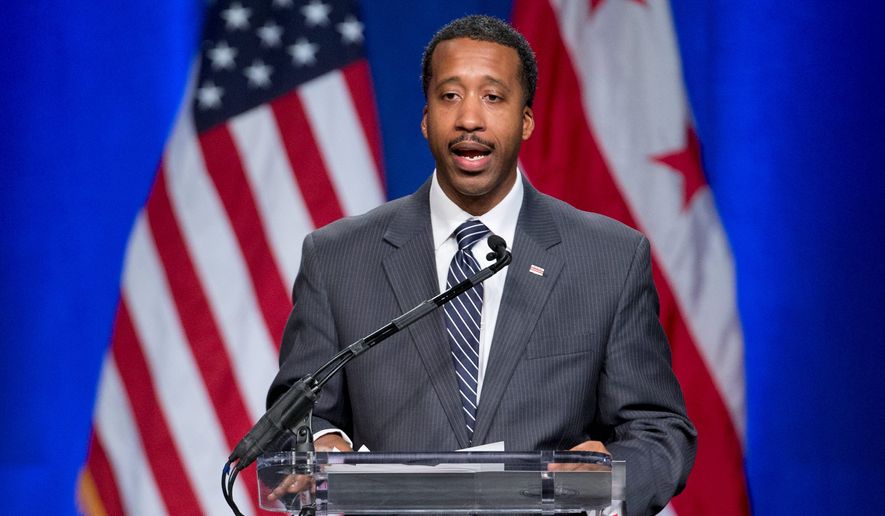The D.C. Council on Tuesday gave unanimous preliminary approval to legislation that would fundamentally change how the District handles juvenile offenders, promoting rehabilitation over incarceration.
Council member Kenyan McDuffie, Ward 5 Democrat and chairman of the Judiciary Committee, introduced the Comprehensive Youth Justice Amendment Act of 2016 in April.
“We know that when a young man or woman comes into contact with the justice system, it is often a pivotal moment in their lives,” Mr. McDuffie said. “Whether our young people arrive at the courthouse door because they ran away from home, they are facing potential deportation, they were arrested for a poor decision or because they face adult charges, they stand at a precipice.”
He said the bill would offer more pathways for troubled youths to become upstanding members of the community by not immediately incarcerating them.
The legislation would prohibit city courts from jailing children before a hearing because no proper adult supervision is available. It also would bar the detention of “status offenders” — juveniles who commit minor offenses such as running away from home. It would limit the use of solitary confinement for juveniles and require stringent reporting when that method of punishment is applied.
Putting children in jail rather than finding a way to keep an eye on them before a hearing could have a lasting impact, Mr. McDuffie said.
“What happens next often sets the trajectory for the rest of their lives and ultimately determines whether they will eventually be contributing members of our community,” the lawmaker said.
According to the Department of Youth Services, about 80 percent of newly committed youths in fiscal 2015 were male and 100 percent were black. Those statistics track with trends over the past 10 years, when committed youths hovered between 80 percent and 90 percent male and 96 percent and 100 percent black.
In fiscal 2015, about 58 percent of youths were incarcerated on felony charges and 42 percent on misdemeanors. Of those jailed, about 76 percent were charged with violent crimes, 16 percent with property crimes and 2 percent with drug violations.
About 10 percent of incarcerated youths stayed in jail, according to statistics from the Department of Youth Services. About 28 percent were remanded to home monitoring, 28 percent were admitted into residential treatment facilities, nearly 20 percent were sent to community-based residential facilities, and the rest were placed in foster homes or residential living facilities. Those figures also haven’t changed much over the past five years.
LaToya Foster, a spokeswoman for Mayor Muriel Bowser, said the mayor supports the bill in general but has some questions about a few amendments that were added Tuesday.
“The executive has reviewed the bill and had numerous discussions, which resulted in recommended amendments to the committee — many of which were adopted,” Ms. Foster said.
Three amendments were approved during the council’s first vote on the bill. One was a technical clarification that included a reference to a relevant federal law that had been omitted. Another called for less-restrictive restraints for women known to be pregnant. The third changed sentencing review for those incarcerated from 25 years to 20 years.
“We’ve reviewed the amendments, and the [U.S. attorney’s office] has raised some technical concerns with the committee,” Ms. Foster said. “We plan to engage in further discussions with the [U.S. attorney’s office] about their concerns and get back to the committee if there are any further revisions or amendments that we would recommend between first and second reading.”
A spokesman for D.C. Attorney General Karl Racine said the office provided input on the legislation, and “we were generally supportive of the bill’s goals to reform important aspects of the District’s juvenile justice system.”
The bill, which is estimated to cost about $6.7 million over the next four years, would prohibit placing people younger than 18 in adult jails and requiring that youths be jailed in certain circumstances, leaving such decisions to judges. It also would bring the District in line with U.S. Supreme Court precedent by eliminating juvenile life without parole sentences.
It would require the Department of Youth Rehabilitation to conduct and submit to the council an annual analysis on root causes of youth incarceration in order to track the successes or failures of giving youths alternatives to incarceration.
• Ryan M. McDermott can be reached at rmcdermott@washingtontimes.com.




Please read our comment policy before commenting.